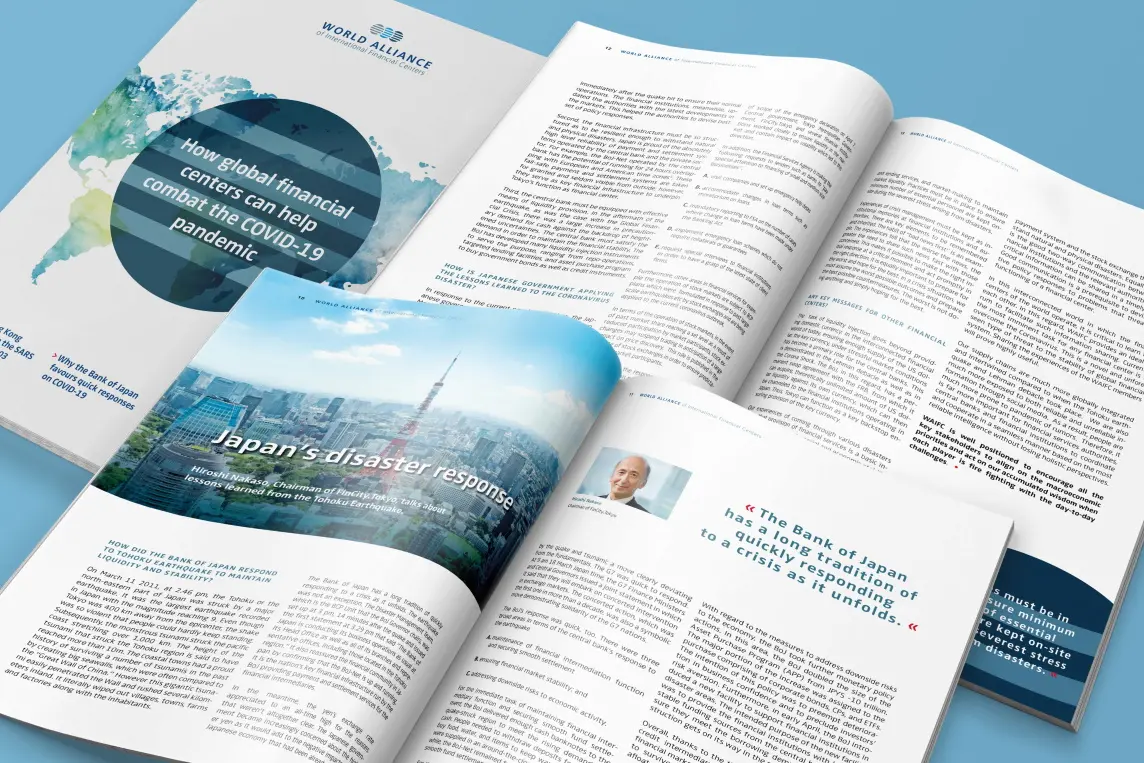
WAIFC Publication on “How global financial centers can help combat the COVID-19 pandemic"
PRESS RELEASE
Rarely has the world faced challenges such as today. Whatever comparison is drawn, COVID-19 and efforts to curb its spread are poised to inflict strain of historic proportions on the world's economy and financial systems. Within just weeks, economic growth has ground to a halt and gone into reverse. The virus knows no borders, nor can economic actions be seen in splendid isolation. Wouldn't it have been helpful had the world been prepared for such a crisis on this global scale?
The WAIFC is a global association comprised of the world's leading financial centers from four continents. We believe it is time to overcome our borders and put competition aside for more cooperation and exchange of best practices. We are convinced that global challenges require global responses.
Together with WAIFC member Frankfurt Main Finance, WAIFC has published a report on "How global financial centers can help combat the COVID-19 pandemic," which highlights lessons learned of the past as well as current activities of our members.
It includes an interview with Christopher Hui, Executive Director of the Hong Kong Financial Services Development Council, who explains why Hong Kong was able to recover quickly from SARS crisis 2003 and what Hong Kong learned for the current crisis:
"Our SARS experience has driven us to respond sooner and with adequate caution to COVID-19."
And Hiroshi Nakaso, Chairman of FinCity.Tokyo, talks about lessons learned from the Tohoku Earthquake in 2011:
"The Bank of Japan has a long tradition of quickly responding to a crisis as it unfolds."
The report is available for free download here.
Arnaud de Bresson, Chairman of the WAIFC Board of Directors and CEO of Paris Europlace, says:
"The first lesson is that all the countries are concerned all around the world and therefore we are in the same boat: to maximize the chances to win this war we must share and work together. A second lesson is that we have to reconsider our economic models and give a new priority to long term perspectives and sustainable economy, it means environmental and social issues. It is the essence of WAIFC to contribute to these new goals and long term partnerships."
"We have much to learn from each other and history. Financial centers like Hong Kong or Tokyo successfully coped with similar challenges in the past. We should draw on these experiences. That is the motivation of our publication. We not only share today's responses and best practices, but we also reflect on historical experiences. It will prove that our financial systems are essential to the solution, and the world can cope with such challenges, given the right response."
Dr. Jochen Biedermann, Managing Director of the WAIFC, says:
"Our members, the world's leading financial centers, stand together and do their part to mitigate the current crisis and prepare for a rapid economic recovery. That is an excellent sign and encourages us to continue our work at full strength."
#StrongerTogether
The World Alliance of International Financial Centers (WAIFC) is a non-profit association registered in Belgium, representing 16 leading international financial centers of four continents. WAIFC members are city governments, associations, and similar institutions developing and promoting their financial centers.
In an era of breakthrough technologies and rapid social change, financial centers are crucial to sustaining economic growth. Thus, the objective of the WAIFC is to create a transparent network that facilitates cooperation and sharing of best practices to further the understanding of the importance of international financial centers for national and global economies as well as social development.
